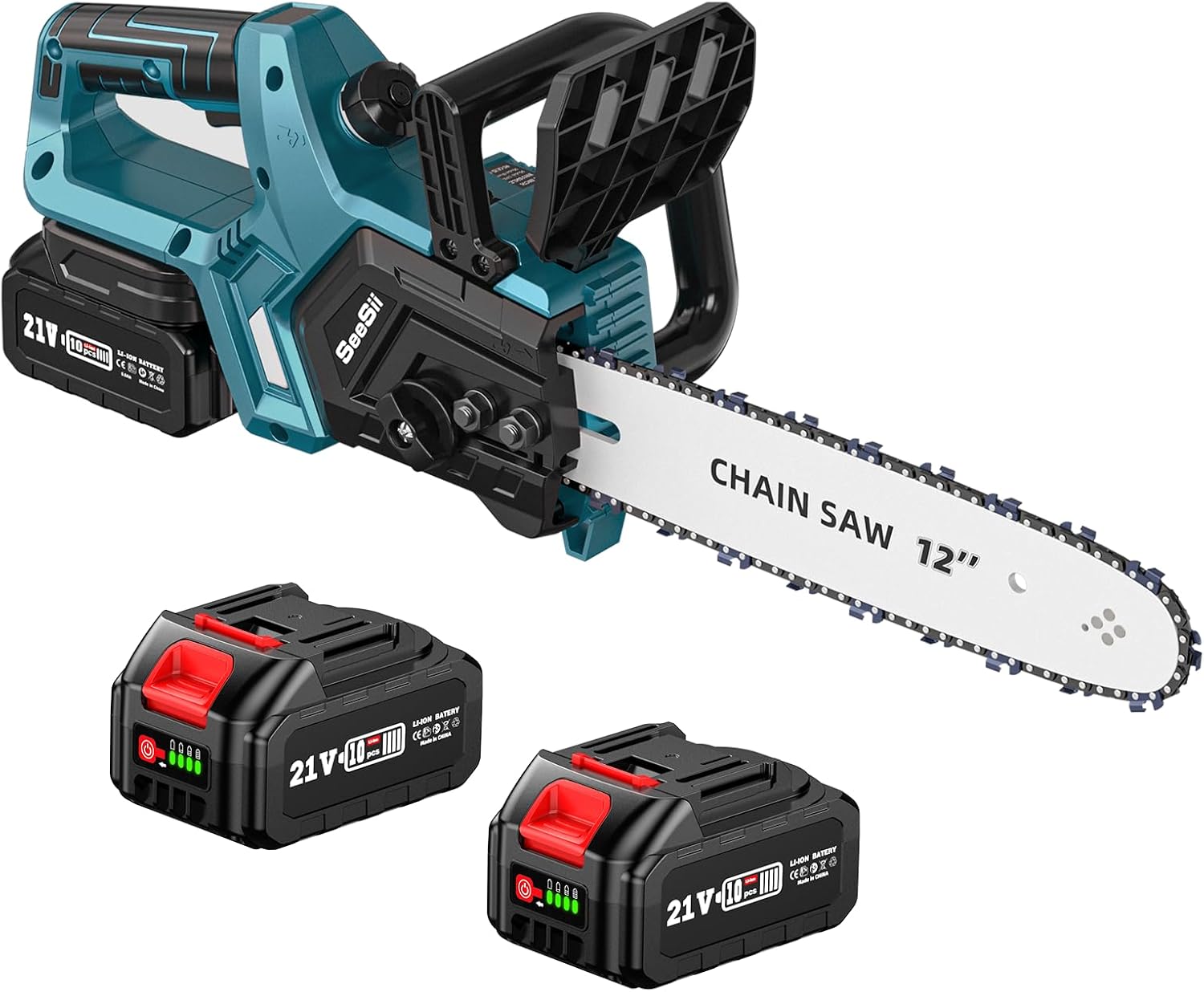Category
When it comes to choosing the right tool for cutting wood, trimming trees, or managing heavy-duty landscaping tasks, the debate between gas chainsaws and electric chainsaws has been ongoing for years. Both types have their own set of advantages and drawbacks, making it crucial to understand their features, performance, and suitability for specific tasks. In this article, we will explore the key differences between gas chainsaws and electric chainsaws, helping you decide which is better for your needs. So, let’s dive into the world of Gas Chainsaw vs Electric Chainsaw and see which one comes out on top.
1. Gas Chainsaws: Power and Performance
Gas chainsaws are renowned for their raw power and ability to handle large, demanding tasks. These tools are powered by gasoline engines, typically two-stroke, which makes them highly efficient for cutting through thick logs and hardwood.

Advantages of Gas Chainsaws
- High Power Output: Gas chainsaws are unmatched when it comes to delivering raw cutting power. They are ideal for heavy-duty tasks such as felling large trees, cutting firewood, or tackling dense vegetation.
- Portability: Since they don’t rely on a cord or battery, gas chainsaws offer excellent mobility. You can take them anywhere without worrying about power outlets.
- Longer Run Time: Unlike electric chainsaws, which may need frequent recharging, gas chainsaws can run for extended periods as long as you have fuel on hand.
- Durability: Designed for heavy use, gas chainsaws are built to withstand tough conditions and are often more durable than their electric counterparts.

Drawbacks of Gas Chainsaws
- Noise and Emissions: Gas chainsaws are notoriously loud and produce exhaust fumes, making them less eco-friendly and unsuitable for quiet neighborhoods.
- Maintenance: They require regular maintenance, such as cleaning air filters, changing spark plugs, and mixing fuel with oil.
- Heavier Weight: Gas chainsaws are generally bulkier and heavier, which can make them harder to handle for extended periods.
2. Electric Chainsaws: Convenience and Ease of Use
Electric chainsaws, on the other hand, are powered by electricity and come in two main types: corded and cordless (battery-powered). These chainsaws are known for their convenience and user-friendly design, making them a popular choice for homeowners and casual users.

Advantages of Electric Chainsaws
- Eco-Friendly: Electric chainsaws produce no emissions, making them a greener option compared to gas chainsaws.
- Quieter Operation: They are significantly quieter, which is ideal for residential areas where noise might be a concern.
- Lightweight and Easy to Handle: Electric chainsaws are often lighter and easier to maneuver, reducing fatigue during use.
- Low Maintenance: With no engine to maintain, electric chainsaws require less upkeep. There’s no need to worry about fuel mixing, spark plug replacements, or engine tune-ups.
Drawbacks of Electric Chainsaws
- Limited Power: While electric chainsaws are suitable for light to medium tasks, they lack the power needed for heavy-duty work like felling large trees.
- Cord Dependency (for Corded Models): Corded electric chainsaws require access to a power outlet, which can limit mobility and make outdoor use inconvenient.
- Battery Life (for Cordless Models): Cordless electric chainsaws rely on battery power, which can run out quickly during extended tasks. Recharging batteries can also take time.

3. Comparing Gas Chainsaw vs Electric Chainsaw
Now that we’ve explored the pros and cons of each type, let’s compare gas chainsaws and electric chainsaws across several key factors to determine which one is better suited for different needs.
Power and Performance
- Gas Chainsaws: Superior power makes them the go-to choice for professional loggers and heavy-duty tasks.
- Electric Chainsaws: While less powerful, they are sufficient for smaller jobs like pruning, trimming, and cutting small logs.
Portability
- Gas Chainsaws: Completely portable, as they don’t rely on cords or batteries.
- Electric Chainsaws: Corded models are restricted by the length of the cord, while cordless models offer more freedom but are limited by battery life.
Ease of Use
- Gas Chainsaws: Require more effort to start (pull cord) and are heavier, which may not be ideal for beginners.
- Electric Chainsaws: Simple push-button start and lightweight design make them more user-friendly, especially for novices.
Maintenance
- Gas Chainsaws: Require regular engine maintenance, fuel mixing, and cleaning.
- Electric Chainsaws: Minimal maintenance is needed, making them a hassle-free option.
Environmental Impact
- Gas Chainsaws: Produce emissions and are less environmentally friendly.
- Electric Chainsaws: Emission-free and quieter, making them a better choice for eco-conscious users.
Cost
- Gas Chainsaws: Generally more expensive upfront and have higher ongoing costs for fuel and maintenance.
- Electric Chainsaws: More affordable initially, with lower operating costs.
4. Choosing the Right Chainsaw for Your Needs
The decision between a gas chainsaw and an electric chainsaw ultimately comes down to your specific needs and preferences. Here are some scenarios to help you decide:
- For Heavy-Duty Tasks: If you need a chainsaw for professional use or heavy-duty work, such as cutting down large trees or handling dense wood, a gas chainsaw is the better choice. Its power and durability make it ideal for demanding tasks.
- For Light to Medium Work: If your primary tasks involve pruning, trimming, or cutting small to medium-sized logs, an electric chainsaw will suffice. It’s easier to use, quieter, and more environmentally friendly.
- For Occasional Use: If you only need a chainsaw occasionally and prefer a low-maintenance option, an electric chainsaw is a great fit.
- For Remote Locations: If you’re working in areas without access to electricity, a gas chainsaw is the obvious choice due to its portability and independence from power cords or batteries.
5. Hybrid Options: Best of Both Worlds?
Some manufacturers have started to introduce hybrid chainsaws that combine the benefits of both gas and electric models. For example, advanced cordless electric chainsaws with high-capacity batteries are now capable of delivering performance comparable to gas chainsaws. However, these models are often more expensive and may still fall short in terms of runtime and power for the most demanding tasks.
6. Safety Considerations
Regardless of whether you choose a gas or electric chainsaw, safety should always be a top priority. Here are some essential safety tips:
- Wear protective gear, including gloves, goggles, and ear protection.
- Read and follow the manufacturer’s instructions.
- Ensure the chainsaw is properly maintained and in good working condition.
- Use the chainsaw in a well-ventilated area (especially for gas chainsaws).
- Avoid using the chainsaw in wet or slippery conditions.
7. Product Gas Chainsaw vs Electric Chainsaw
Gas Chainsaw 58CC Power Chain Saw 20 Inch
This powerful gas chainsaw features a 58CC full-crank two-stroke engine, delivering high power and low vibration. Equipped with a 20-inch guide bar and low-kickback chain, it is ideal for heavy-duty tasks. If you’re comparing Gas Chainsaw vs Electric Chainsaw, this gas-powered option is worth considering for outdoor projects.

Gas Chainsaw 20 Inch, 58CC 8500RPM
This chainsaw comes with a new safety design, including a brake function and guide plate protective cover to reduce recoil injuries. With its powerful engine and reliable performance, it’s a great choice if you prioritize power when comparing Gas Chainsaw vs Electric Chainsaw.

CRAFTSMAN V20 Cordless Chainsaw 12-Inch
This cordless electric chainsaw includes a battery and charger, making it convenient for lighter tasks. Its compact design is perfect for homeowners seeking quiet and eco-friendly solutions when debating Gas Chainsaw vs Electric Chainsaw.

Seesii Chainsaw Cordless 12-Inch Electric Handheld
This electric chainsaw offers decent power but has issues with assembly and chain slipping, as noted in reviews. It’s a quieter and lightweight option, suitable for those prioritizing convenience in the Gas Chainsaw vs Electric Chainsaw debate.

Conclusion
When it comes to the question of Gas Chainsaw vs Electric Chainsaw: What Is Better?, there is no one-size-fits-all answer. Each type has its own strengths and weaknesses, and the best choice depends on your specific needs, budget, and preferences.
If you prioritize power, durability, and portability for heavy-duty tasks, a gas chainsaw is the way to go. On the other hand, if you value convenience, ease of use, and eco-friendliness for lighter tasks, an electric chainsaw is the better option. By carefully considering the factors discussed in this article, you can make an informed decision and choose the chainsaw that best suits your requirements.
No matter which type you choose, both gas and electric chainsaws are valuable tools that can make your cutting tasks easier and more efficient. The key is to understand their differences and select the one that aligns with your needs. So, what will it be: a gas chainsaw or an electric chainsaw? The choice is yours!
